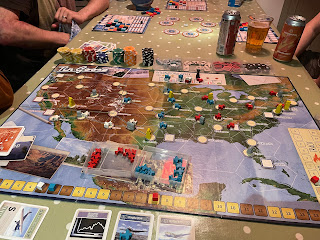The omens for games night weren't good, with rain crashing down outside and in the house (mine; Sam's) an infestation of fruit flies having migrated from the hot bin in the garden. I spent some time chasing them around in a murderous rage, but there were simply too many. A knock on the door and the Easton massif - Gareth, Ian, Martin - arrived in good time to have the little bastards swarm around their drinks. The other ill portent were the crisps - pork and apple Sensations - which tasted, maybe not that surprisingly, gross. Although Gareth charitably ruminated that it was more about expectations, renaming them slow-cooked pork belly in a sweet apple sauce. We were still flicking flies away when Joe and the final Eastonite, Adam H, arrived, upon which time we set up Formula Motor Racing.
We were mostly familiar with it's charms this time, but Martin went through the rules for Adam, who'd not played before. Cards are played to shuffle the cars about, in the hope you'll be at or near the front when the cards run out. You're often moving cars other than your own, but at least you can draft with an overtaking car, or play some kind of punitive measure on someone else. I got my cars to the front early on, but neither finished the race. Adam, who at one point had both his cars right at the back, managed a win at the death:
Martin 7
Ian 6
Gareth 3
I still find it a bit arbitrary-feeling, but agree with Martin that the three-races suggestion in the rules makes sense - it would add some drama and escalation and a sense of shape.
We split into two threes, with Ian, Gareth and Martin setting up Babylonia and Joe, Adam and I playing Tin Goose. Even though I'd played recently I found my mind a blank as I got everything out of the box and tried to summon some kind of zen calm, which was maybe partially successful. In the game players are competing airlines, bidding for more fleets in order to increase their presence on the map - the catch being that everyone is hampered by the chaotic, badly-run and accident prone ways of their airlines and need to improve them as the rounds pass, decades fly by and your starting fleets of Ford Trimotors eventually give way to the airbuses of the skies.
It's only seven rounds, but the opacity of the relative values of everything - with players collectively deciding worth - meant took us a while - so long that at the other end of the table finished Babylonia before I could even get a picture of it, and started playing Azul. Martin won Babylonia rather convincingly as the others narrowly contested second place:
Gareth 118
Ian 117
And followed that with another victory in a tumultuous game of Azul:
Martin 68
Ian 66
Gareth 58






We should have played Swat!
ReplyDeleteOf course!
DeleteI liked Tin Goose, more so this morning as the structure coalesced in my mind a bit more - I almost always feel I'm struggling to make sense of a game on a first play, unless I've learnt it myself prior. I'd like to play again; half way through we realised we should have been taking income each time we placed a plane, so it might feel a bit different next time (though those would have been small sums at first, I guess).
ReplyDeleteI sometimes have a negative reaction to the visual design of a game on a first play (notably Daring Dustbunnies, relatively recently), and I did feel Tin Goose was a bit more of a hotch-potch than necessary - the board mostly. But I think this is related to feeling swamped by the rules of a new game - it puts an extra obstacle in the way of grokking the game, and there are plenty of games I love whose visual design I would quibble with.
I really like High Score - what it lacks in thematic resonance compared to Decathlon it makes up for in pace, and Reiner does those Yahtzee-ish dice-chuckers so well. A lovely evening, htanks all, and Sam for hosting and blogging.
I like Tin Goose - though I could have explained it better - because I like how elusive the value of the planes is, with different players needing more fleets *more* at different times, and the fleets themselves saddled with the downside of Oil and Hazards as well as the upside of more flex on the board. The International track is super-simple but gives some strategic options - as Adam found, it's not a banker though. I personally never want to play Events because I don't like not getting more planes, but both Ian and Joe have used them very well as an avenue to victory!
ReplyDeleteYour second play would be quicker Joe - Ian, Andrew and I bashed through it in an hour after our debut.